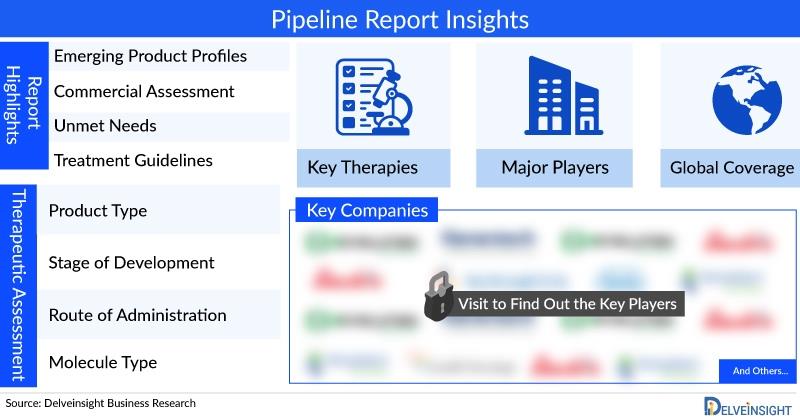
Cardiogenic Shock Pipeline Insight 2025: Novel Biologics, Mechanical Support Devices, And Advanced Pharmacotherapies Drive Clinical Innovation Delveinsight

"Cardiogenic Shock Pipeline Insight"The cardiogenic shock pipeline is advancing rapidly, with novel approaches targeting its high mortality and limited treatment options. Current care relies on vasopressors, inotropes, and mechanical circulatory support (IABP, ECMO), which offer temporary stabilization but lack targeted pharmacologic therapies and long-term solutions-highlighting a major unmet need.
DelveInsight's“ Cardiogenic Shock – Pipeline Insight, 2025 ” highlights a diverse and expanding portfolio of candidates in clinical and preclinical stages. Emerging biologics-including regenerative cell-based therapies and gene therapies-are being investigated to restore myocardial function and reduce irreversible damage. Novel pharmacotherapies such as selective inotropes, metabolic modulators, and vasodilator–inotrope hybrids are under development to enhance cardiac output with fewer adverse effects compared to standard agents. Meanwhile, next-generation mechanical support platforms, including percutaneous ventricular assist devices and miniaturized ECMO systems, are advancing with the goal of improving hemodynamic stabilization and patient outcomes.
The 2025 cardiogenic shock pipeline demonstrates a strategic transition toward integrated treatment models, combining pharmacological innovation with device-based solutions. With growing research investment, supportive regulatory pathways, and increasing recognition of cardiogenic shock as a critical unmet area in cardiology, the pipeline holds promise to transform management-shifting from crisis stabilization to comprehensive, outcome-driven therapies.
Interested in learning more about the current treatment landscape and the key drivers shaping the cardiogenic shock pipeline? Click here
Key Takeaways from the Cardiogenic Shock Pipeline Report
. DelveInsight's cardiogenic shock pipeline analysis depicts a strong space with 3+ active players working to develop 3+ pipeline drugs for cardiogenic shock treatment.
. The leading cardiogenic shock companies include Windtree Therapeutics, Leading BioSciences, and others are evaluating their lead assets to improve the cardiogenic shock treatment landscape.
. Key cardiogenic shock pipeline therapies in various stages of development include Silmitasertib and others.
. In July 2025, the U.S. FDA approved a labeling supplement for IMOVAX Rabies to add a 2-dose pre-exposure prophylaxis (PrEP) regimen (in addition to the 3-dose schedule), referencing NCT03700242 and NCT04127786.
. In July 2025, a Publication in the European Journal of Heart Failure highlighted compassionate-use data showing reversal of shock within 48 hours in three terminally ill patients treated with procizumab. The Phase 2a clinical trial is set to initiate in mid-2025 across 11 centers in Europe.
. In December 2024, the FDA granted premarket approval (PMA) to expand the indication of certain Impella pumps (Impella CP with SmartAssist and Impella 5.5 with SmartAssist) for treating acute decompensated heart failure and cardiogenic shock in pediatric patients, with weight thresholds of ≥52 kg and ≥30 kg, respectively.
Cardiogenic Shock Overview
Cardiogenic shock is a life-threatening condition in which the heart suddenly fails to pump enough blood to meet the body's needs, leading to inadequate tissue perfusion and oxygen delivery. It most commonly occurs as a severe complication of acute myocardial infarction (heart attack), but can also result from other causes such as severe heart failure, cardiomyopathy, or valvular heart disease. Patients typically present with low blood pressure, rapid heartbeat, cold and clammy skin, confusion, and signs of poor organ perfusion like reduced urine output.
The management of cardiogenic shock involves rapid diagnosis and aggressive treatment to restore adequate circulation. This includes supportive care with fluids, medications to improve heart contractility (inotropes), and sometimes mechanical circulatory support devices like intra-aortic balloon pumps or ventricular assist devices. Treating the underlying cause, such as reopening blocked coronary arteries in a heart attack, is critical. Despite advances in care, cardiogenic shock remains associated with high mortality, emphasizing the need for prompt intervention.
Find out more about cardiogenic shock medication at
Cardiogenic Shock Treatment Analysis: Drug Profile
Istaroxime: Windtree Therapeutics
Istaroxime, developed by Windtree Therapeutics, is a first-in-class luso-inotropic agent currently in Phase 2 clinical development. It acts as a powerful positive inotrope by enhancing myocardial contractility through inhibition of the Na+/K+-ATPase enzyme. Additionally, istaroxime promotes myocardial relaxation by activating the SERCA2a calcium pump, offering a dual mechanism of action.
Learn more about the novel and emerging cardiogenic shock pipeline therapies .
Cardiogenic Shock Therapeutics Assessment
By Product Type
. Mono
. Combination
. Mono/Combination.
By Stage
. Late-stage products (Phase III)
. Mid-stage products (Phase II)
. Early-stage product (Phase I) along with the details of
. Pre-clinical and Discovery stage candidates
. Discontinued & Inactive candidates
By Route of Administration
. Oral
. Parenteral
. Intravitreal
. Subretinal
. Topical
By Molecule Type
. Monoclonal Antibody
. Peptides
. Polymer
. Small molecule
. Gene therapy
Scope of the Cardiogenic Shock Pipeline Report
. Coverage: Global
. Key Cardiogenic Shock Companies: Windtree Therapeutics, Leading BioSciences, and others.
. Key Cardiogenic Shock Pipeline Therapies: Silmitasertib, and others.
Explore detailed insights on drugs used in the treatment of cardiogenic shock here .
Table of Contents
1. Introduction
2. Executive Summary
3. Cardiogenic Shock Pipeline: Overview
4. Analytical Perspective In-depth Commercial Assessment
5. Cardiogenic Shock Pipeline Therapeutics
6. Cardiogenic Shock Pipeline: Late-Stage Products (Phase III)
7. Cardiogenic Shock Pipeline: Mid-Stage Products (Phase II)
8. Cardiogenic Shock Pipeline: Early Stage Products (Phase I)
9. Therapeutic Assessment
10. Inactive Products
11. Company-University Collaborations (Licensing/Partnering) Analysis
12. Key Companies
13. Key Products
14. Unmet Needs
15. Market Drivers and Barriers
16. Future Perspectives and Conclusion
17. Analyst Views
18. Appendix
About DelveInsight
DelveInsight is a leading Business Consultant and Market Research firm focused exclusively on life sciences. It supports Pharma companies by providing comprehensive end-to-end solutions to improve their performance. Get hassle-free access to all the healthcare and pharma market research reports through our subscription-based platform, PharmDelve.

Legal Disclaimer:
MENAFN provides the
information “as is” without warranty of any kind. We do not accept
any responsibility or liability for the accuracy, content, images,
videos, licenses, completeness, legality, or reliability of the information
contained in this article. If you have any complaints or copyright
issues related to this article, kindly contact the provider above.

















Comments
No comment